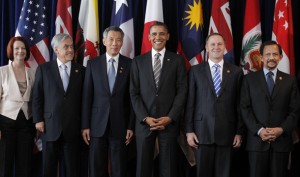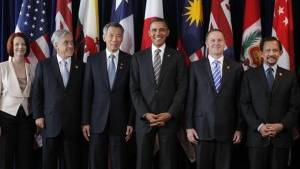Trans-Pacific Partnership: Agenda 21 Meets Global Corporate Takeover
Source: occupycorporatism.com
 The Trans-Pacific Partnership (TPP) “is a key trade initiative” that the Obama administration claims is “seeking to support jobs for American workers by boosting American exports to the dynamic Asia-Pacific region, promote manufacturing, innovation, and entrepreneurship, and at the same time, reflect in the agreement important values on key issues such as worker rights and the environment.”
The Trans-Pacific Partnership (TPP) “is a key trade initiative” that the Obama administration claims is “seeking to support jobs for American workers by boosting American exports to the dynamic Asia-Pacific region, promote manufacturing, innovation, and entrepreneurship, and at the same time, reflect in the agreement important values on key issues such as worker rights and the environment.”However, the agenda of the TPP is a securitization of customs and border patrol services, telecommunications, corporate competition policy that directly effects immigration, corporate investments, and the addition of intellectual property rights with focus on copyright limitations.
The TPP, held in secret, is in actuality a multi-national trade agreement that seeks to extend intellectual property rights across the globe; creating an international enforcement scheme.
In a White House statement , Obama seeks to incorporate America with Canada and the other TPP countries in a “next-generation regional agreement that liberalizes trade and investment.” The press release explains that TPP will build upon “the commitments of NAFTA.”
The TPP defines intellectual property as:
• Copyright
• Trademarks
• Patents
• Geopolitical indicators
 The leaked document drafted as the US TPP Intellectual Property Rights Chapter clearly states that negotiators for Obama are actively pushing for the adaptation of copyright measures that further restrict that is outlined in the Anti-Counterfeiting Trade Agreement (ACTA) and other similar international treaties.
The leaked document drafted as the US TPP Intellectual Property Rights Chapter clearly states that negotiators for Obama are actively pushing for the adaptation of copyright measures that further restrict that is outlined in the Anti-Counterfeiting Trade Agreement (ACTA) and other similar international treaties.There is an initiative to control global IP enforcement by the UN under signatory treaty wherein nations will be mandated to enact domestic laws that have been worded to reflect the provisions in the TPP agreement.
As in the Digital Millennium Copyright Act of 1998 (DMCA), that places federal agencies in control of digital “locks” and enforcement of over=blown statutory damages on claims of copyright infringement; as well as restricting the US Congress from altering existing IP governances as changes in technology and innovation demands such elasticity.
The restrictive nature of the TPP is evidenced in such obligations as:
Strict punishment over temporary use of copyrighted material without the holder’s authorization
Import bans on “parallel goods” from foreign nations wherein copyright authorization is required
Extend copyright terms beyond 70 years as agreed in the 1994 Agreement on Trade-Related Aspects of IP
Enact laws that treat copyright violation and technological protection measures as separate offences regardless of proof that copyright infringement has occurred
Classify copyright infringement as a criminal offense
Complete adaptation of the DMCA Internet Intermediaries copyright safe harbor regime
[...]
Read the full article at: occupycorporatism.com






















